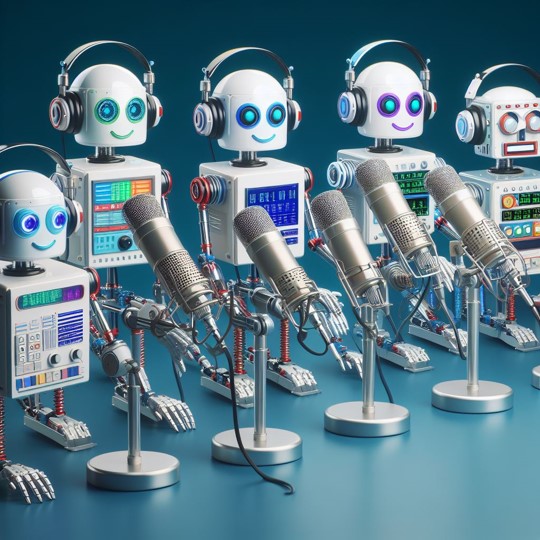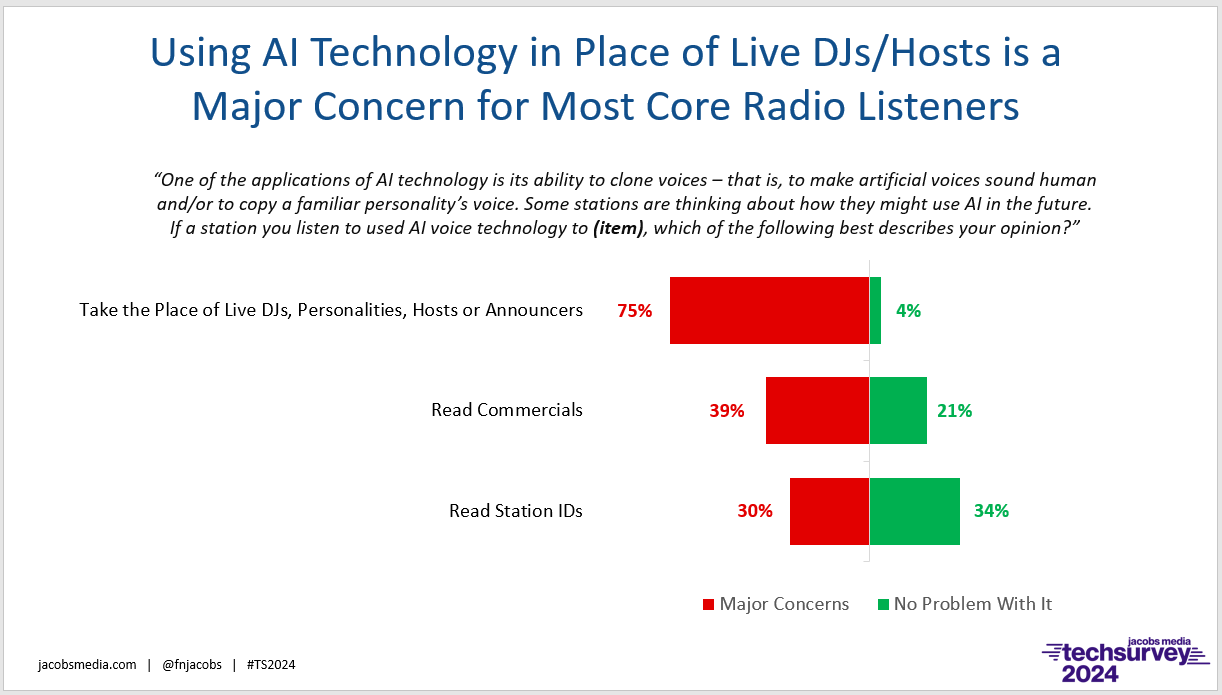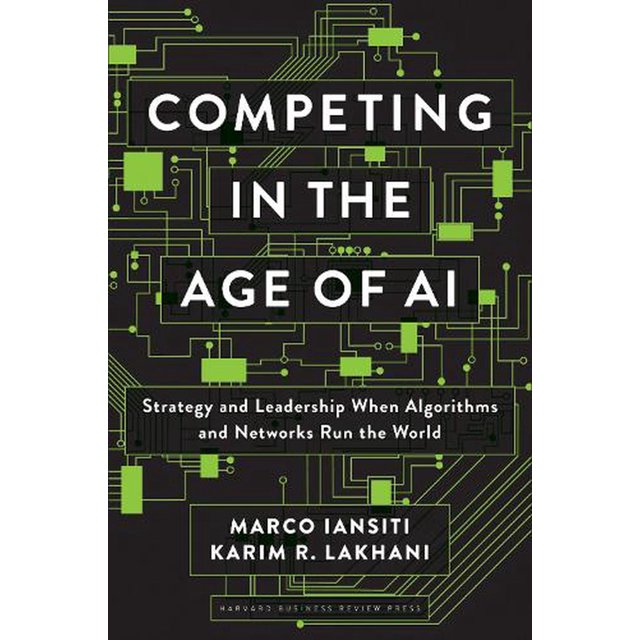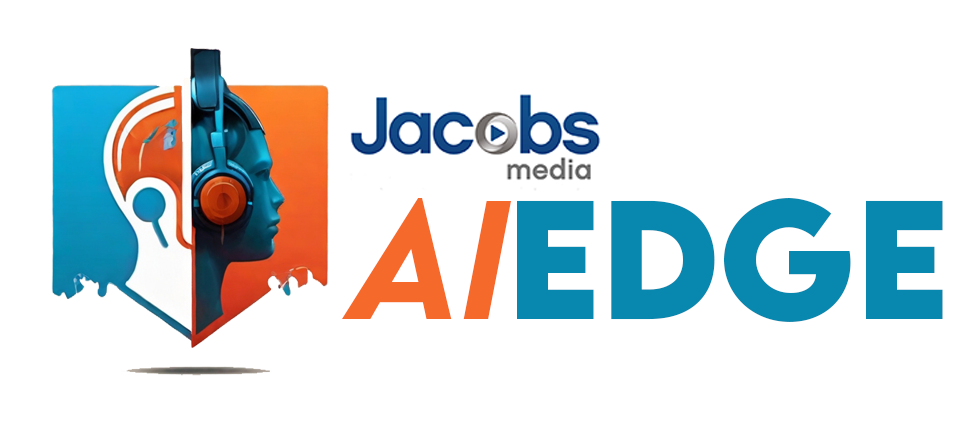
If CRS 2024 convened last week in Nashville proved to us about AI, it’s that we’ve come a long way in just 12 months. Rather than the finger-pointing and paranoia we heard in abundance at the 2023 show, attendees this year were mostly all-in. During our Town Hall session, it was a collaborative gathering where attendees shared their early use experiences with AI technology.
While there was virtually none of the paranoia and vitriol heard just 12 months ago, I suspect that for some radio people, it was bubbling under. And for good reason. While perhaps they were hesitant to express it, I still sense concern among programmers and talent about the prospect of companies misusing this technology.
But beyond the cynicism, is there reason for concern about how audiences perceive radio’s use of AI? At least for now, what will most listeners tolerate, and where will they draw the line? Those were the questions that drove our AI questions in the soon-to-be-released Techsurvey 2024. And more than 31,000 respondents representing key radio formats didn’t hold back.
We approached AI content on three different levels:
- Commercial production – How do they feel about AI-generated voices on station ads?
- IDs and promotional production – Is it OK for stations to use AI to voice basic positioning and identification?
- Shows/airshifts – What about AI-voiced radio shows?
Admittedly, there are lots of variations of how stations produce the content very generally described above. The wording of these questions, and respondents’ own reference points for what we are asking about will vary. So, think of the results I’m going to show you in the generalist of terms.
 They will give you an idea of audience sentiment, but they cannot provide a thumbs up or thumbs down acceptance or rejection of the content in question. After all, respondents are not actually hearing audio, but are asked to make a call based on a written description of how a station might use this technology.
They will give you an idea of audience sentiment, but they cannot provide a thumbs up or thumbs down acceptance or rejection of the content in question. After all, respondents are not actually hearing audio, but are asked to make a call based on a written description of how a station might use this technology.
Your willingness to research your own audience, coupled with how you produce and present the content will go a long way toward determining its passing muster or perhaps causing concern.
Think of these questions as a benchmark or starting point. As we have done with scores of other datapoints – smartphones, mobile apps, streaming, and other measures – a key to fully grasping the environment is to ask these questions over time, which we intend to do.
So, this year is the first inning, Square One – however you refer to it. It’s not the Holy Grail, but it’s a beginning. And it’s an opportunity to see the potential red flags with how radio broadcasters are going to use and position this technology.
not the Holy Grail, but it’s a beginning. And it’s an opportunity to see the potential red flags with how radio broadcasters are going to use and position this technology.
We specifically worded the questions this way:
“One of the applications of AI technology is its ability to clone voices – that is to make artificial voices sound human and/or to copy a familiar personality’s voice. Some stations are thinking about how they might use AI in the future. If a station you listen to used AI technology to _________________, which of the following best describes your opinion?”
The blank above was “read commercials,” “read station IDs,” and “take the place of live DJs, personalities, hosts or announcers” on three successive questions randomized for respondents.
And they could use these responses:
- I would have major concerns with it
- I would have some issues with it
- I would have no problem with it
- Unsure/Doesn’t apply
Here’s how it looks:

Of the three, using AI in place of live talent is a deal-breaker for most respondents. An overwhelming three in four express major concerns about this “use case” for AI. Bear in mind, the question did not incorporate the idea of robots pushing humans out of their jobs, but it’s not a stretch to assume many likely read it this way. And perhaps that’s an accurate way of thinking about how AI might be used by at least some radio producers looking to not only streamline operations but do it for less money.
Using AI to “read” station identification fares the best of the three applications tested. But even there, nearly as many express major concerns as those who give it the green light. Again, this is why we intend to trend these responses over time. Just as CRS 2024 attendees softened their skepticism toward the technology over a year ago, it is likely that as consumers hear various AI applications in content, they may come to accept it more readily. Or not.
As we know, Spotify has created the artificially intelligent “DJ X,” while will.i.am recently introduced qd.pie, a cyber-sidekick on his SiriusXM show. Entertainment media are already walking down this techie path. Look for more “experiments” in this space, whether they are overt attempts like Spotify and SXM, or behind the scenes like how many others are privately dabbling in AI.
And that brings to mind the book Buzz Knight recommended to CRS attendees. Competing in the Age of AI by Marco Iansiti and Karim Lakhani is a book that looks at the ways industries and brands are using the technology, and in the process, redefining their competitive space.
using the technology, and in the process, redefining their competitive space.
The authors make the point that AI is helping companies in areas that include achieving scale, scope, and learning. We saw this in action at CES 2024 in January from mega-corporations like Walmart and Google, to startups at Eureka Park.
The book makes liberal use of case studies, not dissimilar to others in the tech category. Among the many companies they put through the AI lens is Netflix.
For the video streaming giant, there are some backend efficiencies from AI that subscribers don’t “see.” These include dynamic pricing and using A/B testing to select the most effective message to get their customers to respond to marketing messages.
Where the Netflix AI engine is more obvious to us is the ability to recommend content (movies, TV shows, docs, etc.) consumers might also enjoy based on their viewing patterns.
This is nothing new, of course. Netflix has employed algorithms for years, whether classified as AI or not. Obviously, the key is to perfect and hone their recommendation engine so the system operates like a trusted friend who knows our tastes and what we enjoy watching.
The results are still sketchy. Most of us can think of moments when something truly perfect was recommended to us by the Netflix bots. But it’s just as likely we can recall moments when a suggested show or film was strangely out of bounds or simply off-key.
The key, of course, is companies utilizing AI technology to create a better customer/subscriber (and in the case of radio, listener) experience. And it cuts both ways. When the AI is fine-tuned and operating well, we watch Netflix more, remain subscribers, and even put up with the steady stream of price hikes.
This last point is especially important because when a company “gets us” – whether it’s AI-driven or not – consumers often have a sense of appreciation, and might even be more likely to sustain a more expensive service.
service.
When it comes to AI, radio broadcasters need to start with the same premise Netflix and other companies do. That is, how can we use this new technology to create a better experience for our customers.
Sadly, radio often asks how it can use an advance like AI to shave costs, create efficiencies, and accomplish more with fewer people. The listener is often the last consideration.
That’s why Techsurvey exists. We will continue to ask “What if?” questions, as well as explore how nascent technologies and their uses are accepted or rejected by listening audiences.
Stay tuned for the upcoming announcement of the Techsurvey 2024 industry webinar, in partnership with Inside Radio and sponsored by Quu. There are many new questions this year, besides this AI series, designed to glean a better understanding of how audiences perceive and embrace technology.
It’s a brave new AI world.
P.S. To help you stay ahead of AI developments, uses, and thinking about how it impacts radio, Jacobs Media’s Chris Brunt publishes a free newsletter, AI Edge. It’s a practical guide for radio broadcasters.
impacts radio, Jacobs Media’s Chris Brunt publishes a free newsletter, AI Edge. It’s a practical guide for radio broadcasters.
Click here to sign up for it and be sure you don’t miss a moment of how AI will impact radio broadcasting.
- The Rock Hall’s Most Egregious Snub Yet? - May 16, 2025
- Attention Tech And Entertainment Writers: Don’t Mess With Radio! - May 15, 2025
- 3 Socio-Economic Shifts Every Radio Programmer And Seller Should Be Aware Of - May 14, 2025




Is this “the line” radio is about to cross?
http://getonthenet.com/FakeListeners.html
There’s a lot of lines being crossed, as you know, Holland. This service came up at CRS. Some point to the fact (some) morning shows have been using fake callers for yaars, so how is this different. I guess we’ll see.
The zany Morning Zoo is one thing. And long-before AI, Phil Hendrie’s act was remarkable. But it’s time to differentiate funny-business shtick from serious public policy conversations Talk Radio can distort with authentic-sounding fake vox-pop. Certainly that crosses-a-line. And as vendors offer AI-generated newscasts, we are, literally, at risk of info-terrorism. Various techie-nerds I’ve interviewed shiver at the prospect of Tesla and other cars — which get software downloads from the cloud — being hacked. Suppose the hacker tells thousands of cars, all at once, “floor it.” Misstatements on CNBC have already whacked share prices intra-day. Beware fake news.
Hollwand, in no way was I minimzing the dangers of AI being abused by bad actors. We’d had enough of that with written posts on social media,so “deepfake” audio & video are even more dangerous. Disinformation has always been a concern, but advances in AI hav made it moreso. This is why so many radio respondents in our surveys – regardless of their politics – advocate strong government regulations over this technology – before something really disastrous happpens.
My prediction is that AI will not be used where it will do the most good: in the office where it can analyze data and provide guidance for decision making. Computers do very well with manipulating data, as well as mindlessly collecting data.
However, as your questions point out, the focus of AI in radio seems to be on creating voices and content. In my view, that is going to affect air staff the most. After all, it’s every poor leader’s dream: staff that will exactly what you tell them to do.
I believe AI is being talking about in radio offices, I also believe AI is also the only intelligence in the room. In radio, like in the computer world, garbage in equals garbage out.
I asked about on-air applications of AI because it is being marketed that way be several vendors, and I knew a lot of radio people would value this info.
As for whether it will be wisely applied – in the backend office functions – I hope so. I am trying to point out these other applications whenver and wherever I can.
I might consider AI for IDs and dull straight-read commercials. But not for imaging & liners, ultra-creative ad work or actual on-air jocking.
I keep a Casio keyboard at work with some 200+ voices, and endless rhythms and arrangements inside. It doesn’t mean I should cancel my production music library/subscription, even though they both “make music.”
If stations want to save money, they should stop using subscription software. How much is being spent annually on production DAW apps? Switch to ARDOUR and pay peanuts for it only once. Video editors for cutting up in-studio guest footage? Use KDENLIVE for free. The Microsoft office suite? Get the free LIBREOFFICE pack for all the desktops and get the same functionality. Photoshop for those social media pix? Go with GIMP for zero money — you don’t use 60% of the features in Photoshop anyway.
There will always be ways to save a buck. But gutting the one thing that makes radio unique is not the way to go.
And as pointed out in both posts, why not focus on what will make radio a better product delivering better experiencs to audiences and advertisers? Maybe we start there.
I would have to consider our company using AI for commercials and promos, possibly for station imaging. With our limited resources, the help with copywriting and additional voices would be a benefit for our stations. (we are in very small markets).
In many situations as you know, Mike, the “cuts” have already taken place. Now it’s a matter of figuring out how existing staffers can get it all done. In many ways, AI might provide that efficiency.
“Sadly, radio often asks how it can use an advance like AI to shave costs, create efficiencies, and accomplish more with fewer people. The listener is often the last consideration.”
This. Lest we forget, radio is, first and foremost, a business, its main function being to generate profit for its owner(s) and shareholders. Like other businesses, this mandate divorces the business from anything like ethics or morals; they don’t CARE about being “job creators”; they would stab their grandmother’s to save $1k per quarter in operating expenses. The ONLY reason they consider the quality of their content AT ALL is because they NEED listeners. They are FORCED to cater to them. So they want the best “hook,” but will haggle to the bone to pay less for it. I’m sure that Detroit broadcasters go to sleep at night having wet dreams of an A.I. Arthur Penhallow or J.P. McCarthy. Or a virtual resurrection of Wolfman Jack. The only thing stopping them is a fear of fines and lawsuits…things that threaten the MONEY.
Since real-time content is already a thing of the past, perhaps AI can be used to fill in some of the blanks that were created with radio became generic and pre-canned.
Perhaps an updated weather forecast with current conditions, an actual reference to the score of game that’s being played or some traffic information once in a while?
You know, the stuff people said we shouldn’t do on the radio anymore because people can get it on their phones.
The excuse allows us not to talk about anything of recency or value. Perhaps things happening in the moment could be delivered by AI.
And maybe that’s not a bad thing, since the train of real-time content” left the station years ago.
Perhaps the combination of the two might actually be a great supplement to the exciting content humans provide, like the list of “The Top 10 TikTok videos of the week,” going down the list of celebrity birthdays, and the other compelling and groundbreaking prattle that passes for relevant local content.
A contrarian viewpoint, but something to consider.
Unfortunately, the people in charge will very likely not view it this way, and will simply look at it as an other way to eliminate people.
Another insightful article Fred but frankly I do not see how AI won’t infect the control room. The majors are leveraged to the hilt and it’ll be the first line item to go for survival. The guy who said ‘nobody knew the difference in 6 mos of listening’, unfortunately………. will be the norm imo
It’s a real fear, Jimmy. Everyone’s trying to do more with less. But I’m still not hearing how bots are going to move meters and diaries.
If the conglomerates think that an AI voice for the ID is going to increase listenership they are sorely mistaken.
I’m not sure anyone believes that but an AI voice would be cheaper. That’s the concern.